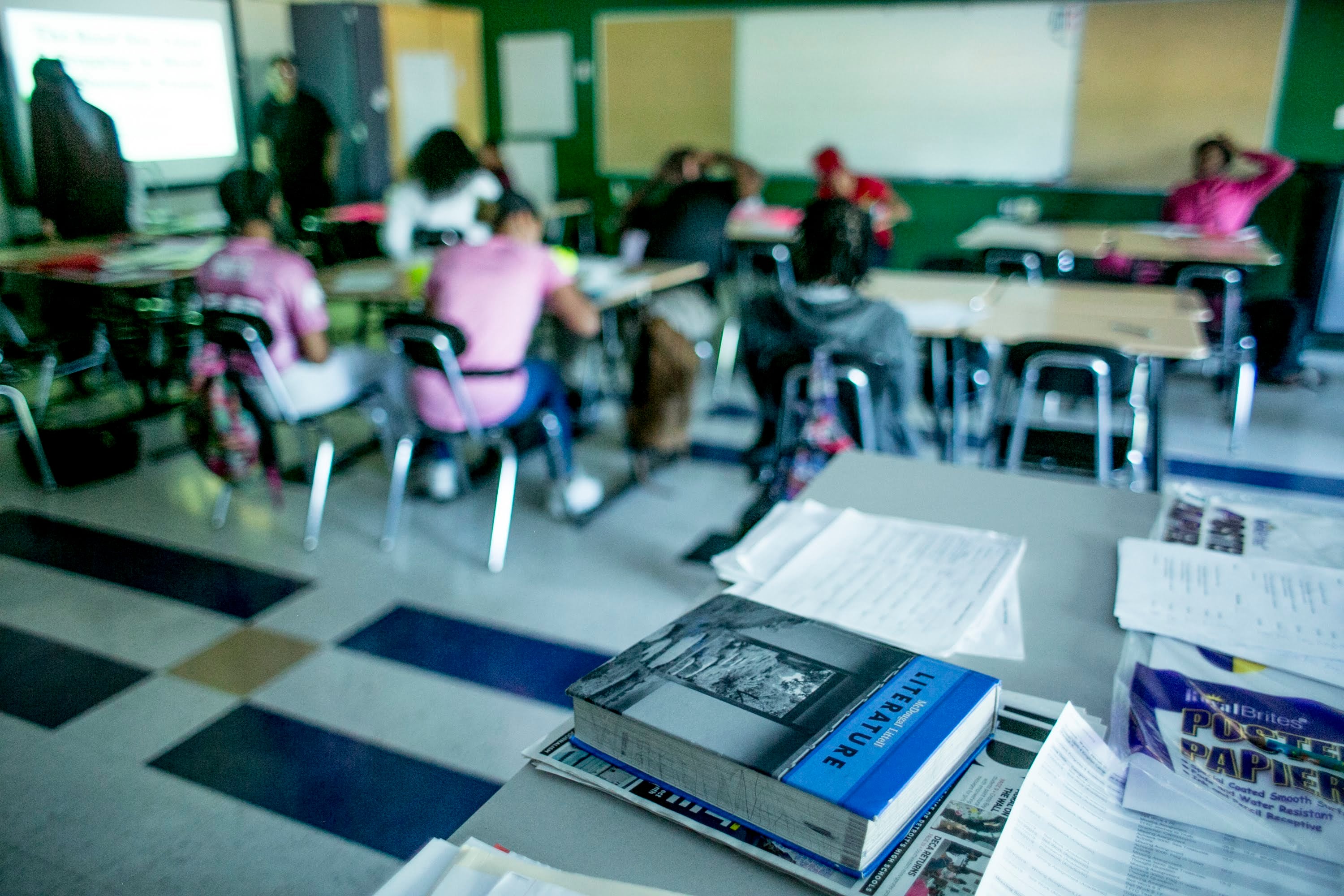Sign up for Chalkbeat New York’s free daily newsletter to keep up with NYC’s public schools.
Last spring, New York City’s Education Department unveiled its most aggressive step yet to increase spending on businesses owned by women or people of color.
The new directive required all vendors with new contracts to subcontract out a portion of their business to Minority and Women-Owned Business Enterprises — a significant commitment for an agency that spends roughly $10 billion a year on contracts.
But the implementation of that promise has proved far more complicated. Late last week, the Education Department began quietly rolling back the requirements for some pending contracts, Chalkbeat has learned.
And the implementation challenges in the new push to increase spending on such businesses — a major priority of Mayor Eric Adams — are even causing problems for companies involved with another top Adams priority — his NYC Reads literacy initiative.
Education Department officials confirmed that certain contracts are now being given the green light to move forward without meeting the new requirements — at least for now. But a spokesperson said the agency still intends to enforce the rules for future contracts.
The subcontracting requirement was introduced in late March, one of a series of changes approved last November as a way to address the department’s abysmal record of doing business with Minority and Women-Owned Business Enterprises, or MWBEs.
Effective immediately, officials said in a press release, the department would require vendors to subcontract out at least 30% of the value of any new contracts to businesses owned by minorities or women.
Schools Chancellor David Banks heralded the move. “We are providing these businesses and their owners with the opportunity to build generational wealth and create a more fair and equal city,” he said in a statement at the time.
Figuring out how to put that mandate into practice threw the contracting system into disarray, interviews and documents show. It touched off months of uncertainty and disruption for vendors and Education Department staff, as top agency officials deliberated behind the scenes over whether and how to insert the new language in recently approved contracts, according to communications reviewed by Chalkbeat.
The process for finalizing new textbook, curriculum, and professional development contracts — including a deal with Great Minds, the company that publishes Wit & Wisdom, one of the three mandated curriculums for Adams’s signature literacy initiative — was essentially at a standstill, according to multiple vendors and Education Department staffers.
Also held up in the logjam were two multiyear professional development contracts for math and literacy instructional support with Houghton Mifflin Harcourt, the publisher of the most widely used curriculum in the NYC Reads initiative.
“Until leadership can make a decision on this we do not expect any contracts to be circulated for signatures,” according to a notice earlier this month from an Education Department official to a vendor obtained by Chalkbeat.
Then, in recent days, the department appeared to backpedal, sending some vendors notice of “shifts in our implementation strategy” and alerting them that they would no longer be required to adhere to the subcontracting goals.
Education Department officials said certain contracts approved by the Panel for Educational Policy after June were given a pass on the new rules during this “transition” period, but did not say how many got a reprieve.
Spokesperson Jenna Lyle added that “all future solicitations and contracts will include these [subcontracting] goals moving forward.”
But the rocky implementation with the recent round of contracts has left some vendors wondering whether the agency has laid the necessary groundwork to implement such a sweeping change and how it will manage the process going forward.
“To me, it seems like they just didn’t do their research to begin with,” said one vendor who said their contract was frozen for months as a result of the standstill. The vendor, who spoke on the condition of anonymity so as not to jeopardize relationships with the Education Department, said they recently received a notice that they would no longer have to adhere to the new subcontracting requirements.
Adams zeroes in on MWBE contracting
The Education Department subcontracting goals are one piece of a larger effort to increase city spending on MWBEs, both in the department and across all city agencies.
Adams appointed a citywide Chief Business Diversity Officer, and Banks named Karine Appollon, a former executive at the nonprofit Reading Partners and educational publishing giant Scholastic, to the newly created role of chief diversity officer to oversee the department’s MWBE efforts.
In November, the Panel for Educational Policy approved a suite of changes to the agency’s procurement rules to ease the process for MWBEs to win large contracts with the Education Department. A parallel change that would incentivize individual schools to hire MWBEs for smaller deals is up for a vote before the panel next week.
The efforts are showing some signs of progress: The Education Department increased its spending on MWBEs from $224 million in fiscal year 2021, to $535 million dollars in fiscal year 2022, Banks said recently. That amounts to 5.6% of contract spending on MWBEs, still last among all city agencies, according to a February report from Comptroller Brad Lander.
That figure is a long way off from the city’s overall goal of directing 30% of all vendor spending to MWBEs. That’s where the subcontracting directive came in.
The directive would guarantee that, even if the primary vendor on the contract wasn’t an MWBE itself, 30% of the value of the contract would end up in the hands of MWBEs through subcontracting.
Companies can subcontract out for all sorts of services, including distribution of print products, technology and software infrastructure, and customer service.
But the directive presented significant challenges for both small and large vendors, according to one person familiar with the Education Department’s contracts processes, who spoke anonymously so as not to jeopardize relationships.
Some smaller companies spend the majority of their contracts on their own staff, while many large companies operate mostly in other parts of the country or world, making it difficult to switch over to MWBEs certified by New York City, who are more likely to be located in and around New York.
“You look at some of the bigger publishers out there, they don’t have distribution or transportation housed in New York City, they wouldn’t be profitable,” the person said. “Most of these companies are now struggling to find an entity to support this.”
Vendors can win an exemption from the subcontracting requirements if there are not enough certified MWBE companies to perform the necessary services, or if they have “legitimate business reasons” for not complying, according to a contract obtained by Chalkbeat. But it wasn’t immediately clear how the Education Department would decide on those exemptions.
New contracts grind to a halt
While officials were debating internally about if and how to implement the thorny requirements, the process for finalizing new contracts effectively ground to a halt.
Typically, contracts are approved by the city’s Panel for Educational Policy and then handed over to the DOE’s legal team, where they are finalized and delivered to the city comptroller for registration. But for several months, contracts for textbooks, professional development and other services that cleared the Panel for Educational Policy made it no further, according to communications reviewed by Chalkbeat.
When vendors don’t have finalized contracts, they have no guarantee of payment. Some larger companies may opt to continue offering their product without payment, but for smaller operators, that can be too much of a financial risk.
For one professional development vendor whose contract was held up, the delay has meant less money flowing in and fewer schools getting instructional support they’ve relied on for years.
“Some of these schools have had these services for many years, and it’s grinding to a halt now,” said a representative from the vendor, who spoke anonymously so as not to jeopardize relationships with the Education Department. “Principals are getting very frustrated…[and] it’s a little bit of a worry for our employees.”
Another contract caught up in the standstill was the one for Great Minds, the company that produces Wit & Wisdom.
As a result, the company’s print materials were temporarily unavailable through ShopDOE, the website where schools buy materials from companies that have contracts with the Education Department, a company spokesperson said. If materials aren’t listed on ShopDOE, schools have to go through a more complicated and labor-intensive process to obtain them.
Wit & Wisdom print materials were added back to ShopDOE in early October, but the contract still isn’t finalized, according to CheckbookNYC.
“Once again the Wit & Wisdom curriculum can be ordered through ShopDOE after a brief delay that occurred when the Great Minds textbook contract was being renewed,” said Great Minds spokesperson Nancy Zuckerbrod.
Among the other contracts approved by the Panel for Educational Policy over the summer but not yet finalized or delivered to the city comptroller is a three-year, $10.6 million textbook deal with McGraw Hill, which publishes widely used textbooks.
Two contracts with publishing giant Houghton Mifflin Harcourt to provide literacy and math coaching and professional development that cleared the PEP over the summer also are not yet finalized, according to Checkbook NYC.
Lyle, the Education Department spokesperson, didn’t say exactly how long it would take to get the pending contracts finalized, but said “we are working with vendors currently going through our procurement process on how they can best support this work as we finalize outstanding contracts.”
Michael Elsen-Rooney is a reporter for Chalkbeat New York, covering NYC public schools. Contact Michael at melsen-rooney@chalkbeat.org.







